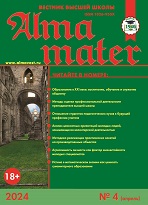UDC 316+378
https://doi.org/10.20339/AM.10-20.012
S.L. Talanov is Cand.Sci. (Sociology), Ass. prof. Senior Researcher at the Sector for Sociology of Deviant Behavior Federal Scientific research Sociological Center of the Russian Academy of Sciences (Moscow) e-mail: talanov_sergei@mail.ru; F.Yu. Kushnarev is Cand.Sci. (Politology), Ass. prof. at Yaroslavl State University e-mail: kushnarevcustoms@mail.ru ; D.T. Berezin is Cand.Sci. (Engineering), Ass. prof. e-mail: dimitry_rus_rub@rambler.ru; and E.S. Rumyantseva is Cand.Sci. (Politology), Ass. prof. e-mail: elenaudit@gmail.com at Yaroslavl State Pedagogical University n.a. K.D. Ushinsky
Analyzed is the impact of restrictions on higher educational system introduced by the Government of the Russian Federation in connection with spread of coronavirus infection COVID-19. Sociological study (online survey) was conducted among students, enrolled in budgetary and extra-budgetary forms of education, as well as among graduates of secondary schools (11th classes), located in small, medium and large cities of Yaroslavl region. In addition, video interviews were conducted, using Zoom service among number of applicants, parents of applicants, teachers, positional experts. It was established, that emergence and spread of COVID-19 and limitations, associated with it, made certain adjustments to strategies of applicants and students. Despite all changes that have arisen due to coronavirus infection, only a small part of applicants and students studying on extrabudgetary basis, decided to change their plans. It is concluded, that for significant part of applicants, obtaining higher education is an attempt to continue to remain in a familiar comfortable environment (continuation of “childhood”). Despite constant stresses at school, expectation from prospect of losing a measured, familiar, predictable life is even more stressful. Parents from families, belonging to medium-resource and high-resource groups, as a rule, support decision of their children to keep on studying. In this case, decision to enter university is made long before graduation. Parents from low-resource groups, as a rule, try to give profession, not a higher education. At the same time, it was revealed, that children from families, belonging to low-resource groups, for the most part, anyway note that if they had necessary resources, they would try to get higher education. In addition, the authors conclude, that decision on admission to university is greatly influenced by not at all economic capital of family, how much family’s value, as well as influence of the reference person.
Key words: online survey, video interview, coronovirus infection, COVID-19, applicants, students, universities, reference person.
References
1. Bourdieu, P. Espacesocialetgenèsedes «classes». Actes de la rechercheens ciences sociales. 1984. No. 52–53. P. 3–14.
2. Inglehart, R. Culture Shift in Advanced Industrial Society. Princeton, 1990.
3. Jamal, F., Fletcher, A., Harden, A., Wells, H., Thomas, J., Bonell, C. The school environment and student health: a systematic review and meta-ethnography of qualitative research. BMC Public Health. 2013. Vol. 13. P. 798.
4. Tibbetts, Y., Priniski, S.J., Hecht, C.A., Borman, G.D., Harackiewicz J.M. Different Institutions and Different Values: Exploring First-Generation Student Fit at 2-Year Colleges. Frontiers in Psychology. 2018. Vol. 9. P. 502.
5. Talanov, S.L. Influence of reference person, social capital of family group on formation of educational and professional strategy of children. Alma mater (Vestnik vysshei shkoly). 2020. No. 4. P. 28–37.











.png)






